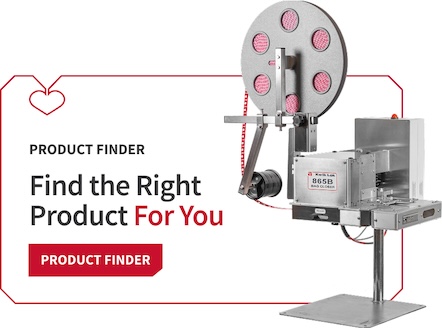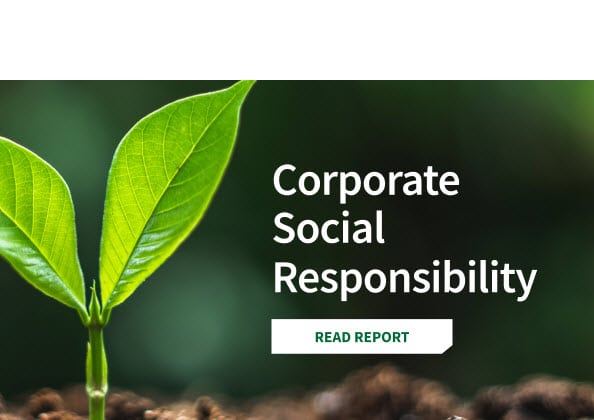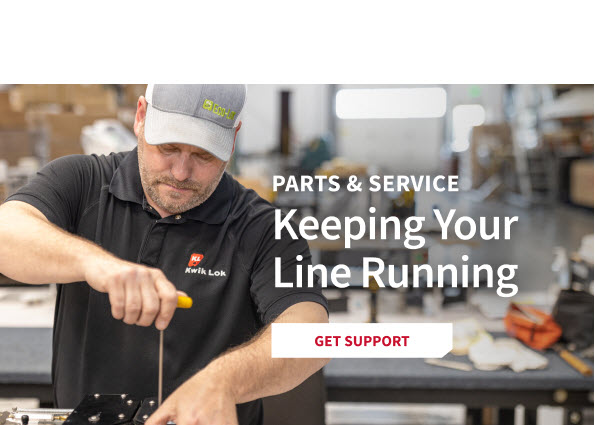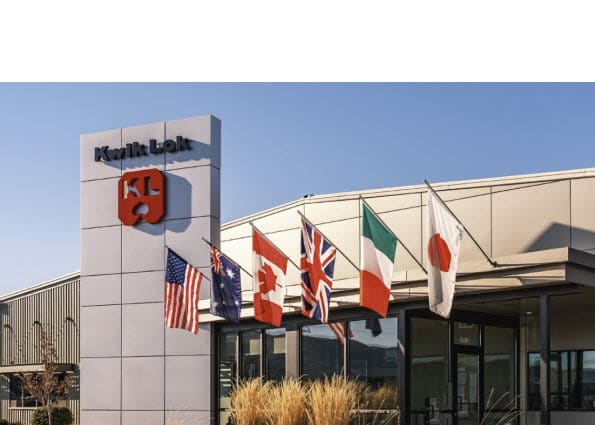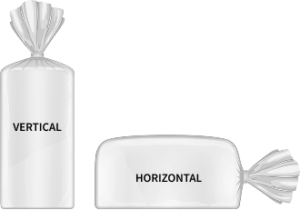By Baking and Biscuit International

Eric Hill took on the CEO role of Kwik Lok Corporation in November 2024. Blair Chastain has been the Chief Revenue Officer since February 2023. Together, the new leadership team at Kwik Lok talks packaging and packaging waste regulation, European and global market strategies, and the company’s advances in supporting bakeries to navigate changes in these areas.
Catalina Mihu: The EU’s Packaging and Packaging Waste Regulation (PPWR) came into force on February 11, 2025, aiming to reduce the use of primary raw materials for packaging and to support recycling. What changes does it bring for bakeries and how has Kwik Lok been preparing to support them?
Eric Hill: Based on what we are experiencing and what we heard at the recent IBA show, bakeries need to change their packaging to meet the umbrella requirements. As more specific requirements are being defined over the next several years, we expect that bakeries are going to have to make changes to their closure materials, which is our focus, in particular. We believe we’re well positioned to provide exciting solutions for bakeries.
Kwik Lok has the solutions that European bakeries need. Our closures are already being used all over the world. Whether it’s our Fibre-Lok or Enviro-Lok family of closures, we are able to match different packaging materials so that our customers can meet the recyclability and circular economy requirements listed by the PPWR. These are product qualities that we know consumers want.

”WE HAVE SOME GREAT EQUIPMENT INNOVATIONS THAT WE’RE BRINGING TO IBIE, INCLUDING THE ENVIRO-LOK PE AND THE 872 PLUS.” – Eric Hill, CEO, Kwik Lok
Mihu: What was the narrative around PPWR at iba?
Blair Chastain: At IBA, we saw first-hand that bakeries are going to need to make changes in light of the PPWR, and we’re already seeing it in motion. They have been asking for solutions to help them make that change. In Europe, double wire is predominantly used currently. This type of closure just isn’t going to meet the PPWR requirements. This is why we have been seeing significant momentum for the sustainable and wire free closure options that Kwik Lok offers, at the show and since.
Mihu: How would you compare the double wire packaging closure with the loks that you are providing, from a practical standpoint, as well as in view of the PPWR rules?
Blair Chastain: We need to meet our customers where they are; some want to use a bag closure to be recycled with their bags, for ease of recycling, for instance. Our Enviro-Lok PP (polypropylene) meets this need and can be recycled with a polypropylene bag. We have a new member of the Enviro-Lok family launching soon, the Enviro-Lok PE (polyethylene), that will also be recyclable with a polyethylene bag. To make our Enviro-Lok family of closure labels more recycling friendly, we also ultrasonically weld the labels onto the closures, instead of using glue. This process makes that product a recyclable solution. Other customers are more focused on paper-based products and looking at composability benefits; we have solutions for them as well. While not every customer is the same, all Kwik Lok solutions will meet the PPWR requirements.
Looking at the differences between our closures versus others, such as double-wire, twist ties and tape, we see that in addition to meeting European regulations, many of our bakery customers want to communicate more on the closure itself. Specifically, the best buy date, lot numbers, and/or the opportunity for many other brand messages. With our fully integrated systems that include printers, we can also print 2D barcodes right on the closure or on a full color label fixed to our closure so they can communicate even more with the customer. A lot more data can be housed using the 2D barcode, so closures become a real-time communication medium via a digital platform. With 2D bar codes, consumers can engage with brands and manufacturers can easily elevate the dialogue and react. We received great feedback on this at IBA. Bakeries recognize there’s a huge marketing opportunity here.
And, of course, the practical aspect meets customers’ needs. With loks, they get a very convenient solution to close the packaging bag, repeatedly. Our closure is much better in this regard, because you can take it off and put it back on to preserve the product’s freshness throughout the time it is consumed, which helps reduce food waste and cost. We want to help our customers keep their food fresh and have it last as long as possible, and the lok’s ability to reclose does just that, without fail. This is as important to us as it is to our bakery customers and consumers. Simple and practical!
Eric Hill: We’re making sure that we’re providing what the customer needs, but with a real eye on the consumer. Another observation about the double-wire closure is that it’s essentially a metal wire, which also introduces a host of issues in bakeries. Bakeries want to be metal-free, for safety reasons and from a sustainability perspective, too.
And, to add to Blair’s comment about using packaging closures as a communication piece, our customers want to find more and more innovative and creative ways to engage with the consumer. Having printable solutions, especially on labels, provides plenty of billboard space for our customers to communicate with the consumers. As we are already seeing, consumers are more engaged than they’ve ever been and want to communicate and interact with the products and the brands. The closure-and-label provides a very important value proposition for our customers. That’s going to continue to be an important consumer trend as we go forward. on it.
EU’S PACKAGING AND PACKAGING WASTE REGULATION
Mihu: What similarities from other markets can help you and bakers prepare for PPWR changes?
Eric Hill: I think each region across the globe has slightly different requirements but many similarities we can apply. For instance, we can use some of our work in Canada on materials like fiber and polypropylene and apply it across the globe where it makes sense. We don’t want to create a unique solution from scratch for every region.
That’s why it’s important for us to have a common manufacturing platform and ways to go to market. The approaches will converge at some point. The set of materials is pretty well defined and the materials that are currently available really fall into a few families, even if a lot of variability exists within them. We are now well-positioned to be able to support each of those families of packaging materials – the core materials, whether it’s polyethylene, polypropylene, or a fiber-based solution. We have a range in each of those material sets.
Mihu: Out of these families of materials, what different preferences do you see in certain markets?
Blair Chastain: There definitely seems to be preferences. Europe is a mixed bag right now. But low-density polyethylene (LDPE) bags are among the widely used solutions. Manufacturers want to pair them with a polyethylene closure. In cases where polypropylene bags are used, they tend to be combined with closures of the same material, to help recycle them at a larger percentage.
In our Australian market, plastic is avoided in favor of fiber-based products. For any of these materials, there is always a trade-off in terms of fit and function. We have to make sure we recommend the best solution according to each customer’s expected business outcomes.
Eric Hill: The core concept of a circular economy is transcendental across all regions. They might have different competing goals, but we are also seeing a fairly common demand across markets. Sustainability is very important to us; our owners are very committed to sustainability. We have our own internal goals and objectives to achieve, whether it’s in Environmental, Social and Governance (ESG) metrics, or investing in materials with a positive impact on the circular economy.
And that is part of my philosophy, it’s a core belief of mine as well – to continue to invest before the consumers’ needs are even signaled in the market.
Blair Chastain: For us, sustainability is a balance between the ability to recycle and the ability to offer these sustainable solutions at a competitive price – and a big part of our strategy is to ensure this balance I achieved.

”AT IBIE, WE ARE INTRODUCING THE 872 PLUS, A BAG CLOSING MACHINE THAT WAS COMPLETELY REDESIGNED TO MEET THE EXISTING CUSTOMER DEMANDS.” – Blair Chastain, Chief Revenue Officer, Kwik Lok
CONNECTING THE DOTS
Mihu: What are some of these expectations for sustainability on your to-do list and what are some new opportunities for bakeries to advance their sustainability efforts?
Eric Hill: We are now releasing a new extension to one of our product lines, a polyethylene-based product, which really helps round out our portfolio of options. Engineering and product development work are usually long-term projects. For our latest release, Enviro-Lok PE, we considered how it performs in the market and that it has to work on the equipment which bakeries currently use to close their bags. It may sound simple, but it does take quite a bit of work, as materials continue to evolve and the availability of certain materials, such as recycled materials, continues to change. Performance of these materials is also evolving. Novel material science is our focus, supported by novel technologies. The new Enviro-Lok PE lok was literally the first thing I was introduced to when I walked in the door, so it’s been an exciting ride!
Our strategy is built around meeting customer demands, consumer expectations and positioning ourselves for future materials and requirements in the marketplace. Connecting the needs, wants and capabilities – both internal and external – and developing strategies that fit the profile means we need to really skate to where the hockey puck is going.
Blair Chastain: We are making sure that we align with the market trends and current science. To do this, we have to carry out the best possible lifecycle analyses and we partner with organizations with similar goals like global plastic pacts and a wide variety of associations in the bakery and other industries. We capture learnings from different regions and incorporate them into successful models that can be adopted in others. As we look at new products, we are not going to stop innovating. We’re going to keep evolving. We’re already thinking three to five years in advance about what the next solution could be that benefits the customer, consumer, and the environment.
Eric Hill: Building on that, solutions have to work for the whole supply chain: a bakery doesn’t want their bread packaging to open on their line, spilling slices of bread all over their factory floor. The packaging also has to work for the retailer and for the consumer. If the solution is of value to the consumer, it’s going to bring the consumer back to that product more frequently and interact with that product in a more positive way. There are a lot of inputs to keep track of, to Blair’s point, and overlooking some aspects may become costly.
That’s why we make sure that we’re considering all relevant facts and we’re aiming our investments and our innovation in the direction that considers all of them.
NEW! PRODUCT LAUNCH
Mihu: Could you share more details about the new solution that will be introduced at IBIE?
Blair Chastain: We are really excited about launching the new Enviro-Lok PE closure. Another highlight is a machine that we announced at IBA as a preview: the 872 Plus, a new bag closing machine based on the success of previous 872 models. Using feedback from current customers, the machine was completely redesigned to make it even better while meeting the existing customer demands. Specifically, we incorporated feedback received into its design, revolving around the concept that less is more. So, the closing machine comes with fewer parts, less complexity (and easier to learn, in light of skilled labor shortages), less maintenance, less weight, and simple setup and operation. In addition, it also costs less over the life of the machine compared to any other machine built previously.
Eric Hill: If you have fewer adjustments to make, fewer moving pieces, it tends to relate well to the reliability of the equipment. We still are going to have customers whose process requires more flexibility, because they’re running products that vary greatly or require a higher level of integration. This new solution addresses the needs of bakeries that seek ease of operation and improved performance, and it rounds out our portfolio. If customers don’t need complexity, they should not have to pay for it, and this solution offers that choice.
Mihu: What kind of bakeries is it aimed at?
Blair Chastain: All bakeries can use it, from small to midsize and large. The 872 Plus machine closes up to 120 bags a minute. It will be faster than what any bakery usually runs. Various levels of integration are available, depending on the operation’s size and needs.
Mihu: Will the 872 Plus and the new Enviro-Lok PE be available worldwide or only in certain markets?
Eric Hill: The new Enviro-Lok PE can already be produced in several of our plants. We are scaling up so we will eventually have production capabilities across the globe and able to produce Enviro-Lok PE wherever it’s needed.
Blair Chastain: The 872 Plus will be available across the globe, the major focus will be within North America and the EU, where we see the most opportunity.
A BUSINESS BUILT AROUND SUSTAINABILITY
Mihu: Providing something that’s easy to use has been the cornerstone of the company since its launch. With some of the newest developments, excitement and experience are added on top of utility. How is the 70th anniversary milestone marked in Kwik Lok’s agenda, R&D included?
Eric Hill: Kwik Lok has had 70 years of continued manufacturing. Through that time, the markets that we serve have changed significantly. In turn, that required us to develop our portfolio of solutions. It means that we are a stable company that can provide value for our customers. It’s very important to us to have the right solutions for the market, the regulations and the times. It’s a great company and it’s what drew me to Kwik Lok. We know what we’re doing with 70 years’ worth of institutional knowledge. We have a history of innovation, and we are investing in the future of the industry.
“THAT’S WHY IT’S SO IMPORTANT TO US TO BASE OUR WORK, PARTICULARLY OUR MATERIAL SCIENCE, ON SCIENCE, BECAUSE THEN WE HAVE THE DATA WE NEED TO PROVIDE TO CUSTOMERS.” -Eric Hill, CEO, Kwik Lok
Blair Chastain: We are a family company in the third generation, and we are all very much committed to growth, service, sustainability and innovation, and most of all our people. This is why we can continue to be agile and nimble with our approach and why we can adjust to vastly different market demands and considerations. The world is changing so rapidly, and we have to be at the forefront of it. While it may seem like our loks are just a simple closure, there is an entire strategy driving the company behind these closures with a lot of aspects to consider as we continue to evolve. It’s truly an exciting process.
Mihu: The company’s 70th anniversary also coincides with a transition in its leadership. How is continuity ensured and what new perspective do you bring to Kwik Lok’s strategy?
Eric Hill: I’ve been in the packaging industry for the last 15 years. Before that, I spent 13 years working for one of the largest consumer products companies in the world and I think that, throughout this time, many aspects transcended both companies and now provide a holistic view of the supply chain and the consumer chain. A consumer products company is very focused on what exactly the consumer needs, what the consumer wants and how to deliver it. For Kwik Lok, this means how packaging can support the producer and the consumer. And that affects your go-to-market, your innovation, and the investments in your people. I’ve seen how packaging can play a significant role in what the consumer needs and wants, from both the consumer product company’s viewpoint, as well as how a packaging company has to solve those problems and run a productive business. Kwik Lok is a great company and it’s my job to make it an even better company going forward. My experiences are going to help us as we continue to evolve.
There are a lot of expectations around sustainability and technology is still catching up to these expectations. We plan to continue to develop sustainable solutions. Innovation is a core part of the success of our company, and it will drive our evolution, innovation in packaging materials, as well as in packaging and labeling technology.
We will never tell the folks on our manufacturing floor that this is the last material that they’re going to have to learn how to run. That’s just not true. We’re going to continue to evolve together with the technologies that support us. It’s a very exciting time and I am elated to lead the company into this next phase.

ACCORDING TO PLAN
Mihu: On the topic of company strategy, what strategy changes have you made since the management changes?
Eric Hill: Six months in, I would like to reiterate: this is a good company! There is no need to turn things around; it’s really about taking a great company and making it better. I am focusing on subtle changes, and primarily on bringing to market some of these key innovations. We have some great innovations that we’re bringing to IBIE, including the Enviro-Lok PE and the 872 Plus. The bigger strategic changes will evolve over the next business
cycle.
Mihu: What will the transition to PPWR compliance mean for your work with bakeries from now on?
Blair Chastain: We’ve had extensive discussions about making the necessary changes, whether it’s a fully integrated Kwik Lok solution or a small modification to an existing line. We have the resources and the partners to meet the customers where they are.
Eric Hill: I think the great thing about Kwik Lok is that we’re really looking at a whole solution to make sure that our customer succeeds; we’re not just selling the consumable, the lok alone.
KWIK LOK PARTNERS WITH PLASTIC PACTS
As part of its commitment to sustainability and combating climate change, Kwik Lok is a part of the following plastics pacts to help accelerate progress across the entire plastics value chain. All of the pacts support the Ellen MacArthur Foundation’s Global Plastics Pact Network with hopes of bringing a unifying voice to plastic packaging guidelines, policy, education, labeling, access, and infrastructure. Kwik Lok is a member of:
+ The US Plastics Pact
+ European Plastics Pact
+ ANZPAC Plastics Pact
+ Canada Plastics Pact
The Plastics Pact Network, convened by the Ellen MacArthur Foundation and WRAP, connects national and regional initiatives around the world to implement solutions towards a circular economy for plastic.

Mihu: When you work on a project with a client and look at the specific market infrastructure, do you also suggest reusing or recycling guidelines that they could follow for the equipment and the materials that they choose?
Blair Chastain: Yes. We aim to make it simple and easy for our customers, and we want them to be able to wash, rinse, and repeat. This means having the proper documentation, training resources, visuals, and supporting team behind the scenes and in person.
Eric Hill: That’s why it’s so important to us to base our work, particularly our material science, on science, because then we have the data we need to provide to customers. We can answer questions such as, ‘Where does this fit in with a circular economy?’, ‘What are my product end-of-life options?” We want to be sure that our customers are confident in any claims they make and that we are able to back them up with the science or the certification that may be appropriate in their country.
We have specific project teams that are working on connecting material science with the market needs. We are both a global and a regional company at the same time, in this regard.
”WE ARE A FAMILY COMPANY IN THE THIRD GENERATION, AND WE ARE ALL VERY MUCH COMMITTED TO GROWTH, SERVICE AND INNOVATION, AS WELL AS OUR PEOPLE. THIS IS WHY WE CAN CONTINUE TO BE AGILE AND NIMBLE WITH OUR APPROACH AND WHY WE CAN ADJUST TO VASTLY DIFFERENT MARKET DEMANDS AND CONSIDERATIONS.” -Blair Chastain, Chief Revenue Officer, Kwik Lok
Mihu: Speaking about the people working at Kwik Lok, how big is the global team?
Eric Hill: We’re around 300 people globally, spread out pretty equally across the globe, with a few more people here, at our headquarters in Yakima.
Blair Chastain: And then we have the extension of Kwik Lok, which are our key distributors and bagger manufacturer partners across the globe. Although we have 300 direct employees, we do have a few hundred more indirect staff who represent Kwik Lok, aligning with our brand values, workflow and function.

